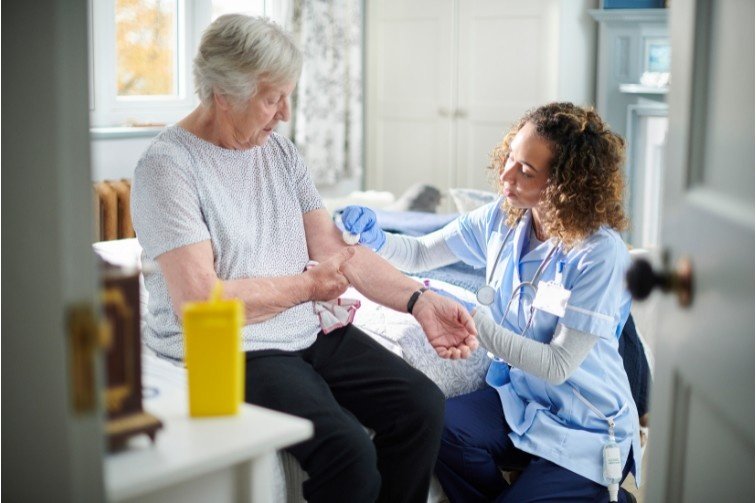Does Medicare Cover Home Health Care Services? What You Need to Know
Getting older often means needing extra help at home. Maybe you’re recovering from surgery. Or perhaps a chronic condition makes daily tasks harder. The good news? Medicare does cover home health care services if you meet certain requirements.
Many people are unaware that they can receive professional physical therapy, nursing care, and other medical treatments in the convenience of their own homes. What Medicare covers, how to qualify, and what to do are all covered in detail in this tutorial.

What Is Home Health Care?
Home care services mean medical services delivered right to your home. A nurse might visit to change wound dressings. A physical therapist could help you regain strength after a fall. A speech therapist might work on swallowing problems. This is different from having someone help with cooking or cleaning. Medicare covers medical care—not housekeeping services. The best part? You get professional care without leaving home. No driving to appointments. No waiting rooms. Your bedroom becomes your recovery room.Does Medicare Cover Home Health Care Services?
Yes, Medicare covers home health care. Both Part A and Part B pay for these services when you meet specific conditions. You don’t pay anything for covered home health visits. Medicare pays 100% of the cost. But you must meet four basic requirements first.The Four Requirements to Qualify
You Must Be Homebound
Being homebound doesn’t mean you’re trapped inside. You can leave your home occasionally. Short trips are fine. You can go to doctor appointments. You can attend religious services. You might visit family for special occasions. A trip to the barber or salon is okay, too. What matters is that leaving home takes considerable effort. You might need help from another person. Or you need a wheelchair, walker, or crutches. Maybe you’re too weak to leave safely. Your doctor decides if you’re homebound. They look at your overall condition and mobility.You Need Skilled Care
Medicare only covers skilled medical services. This means care from licensed professionals like nurses or therapists. Skilled care includes:- Wound care and IV therapy
- Physical therapy exercises
- Speech therapy for communication problems
- Managing complex medications
Your Doctor Must Order It
Your doctor must certify that you need home health care. They’ll see you face-to-face either 90 days before your care starts or within 30 days after. Then they create a plan of care. This plan lists exactly what services you need and how often. Every 60 days, your doctor must review and renew this plan.
You Use a Medicare-Certified Agency
The home health agency must have Medicare certification. Not all agencies qualify. Check if an agency is certified at Medicare.gov or call 1-800-MEDICARE. Using a non-certified agency means Medicare won’t pay. Always verify certification before care begins.What Home Health Services Does Medicare Cover?
Skilled Nursing Care
A registered nurse or licensed practical nurse visits your home. They provide part-time or intermittent care. Nurses can give injections. They monitor your vital signs. They teach you about medications. They change dressings on wounds. They manage feeding tubes or catheters. Medicare allows up to 8 hours of nursing care per day. You can receive care up to 7 days a week if medically necessary. The total usually caps at 28 hours per week.Physical Therapy
A physical therapist helps restore movement and strength. Maybe you had hip replacement surgery. Or a stroke affected your walking. Physical therapy gets you moving again. Sessions happen in your home. The therapist designs exercises for your specific needs. They might work on balance, flexibility, or pain management.Speech-Language Therapy
Speech therapists treat communication and swallowing disorders. After a stroke, you might struggle to speak clearly. Some conditions make swallowing dangerous. These specialists help you regain these critical abilities. They work on speech, language, and safe eating techniques.Occupational Therapy
Occupational therapy focuses on daily living skills. A therapist teaches you how to dress yourself. They show you safer ways to move around your home. They recommend helpful equipment. Important note: Medicare only covers occupational therapy if you’re also getting physical therapy or speech therapy. It can’t be your only service.Home Health Aide Services
An aide helps with personal care like bathing, dressing, and grooming. But there’s a catch. Medicare only covers aide services when you’re also receiving skilled nursing or therapy. The aide’s support must relate to your treatment plan. If you only need help bathing and dressing without any skilled care, Medicare won’t pay. Aide services are limited to 28 hours per week, combined with skilled nursing care.Medical Social Services
Social workers provide counseling and help you find community resources. They assist with emotional concerns related to your illness. They connect you with support services. Again, this only applies when you’re receiving other skilled care. Social services alone don’t qualify for Medicare home health coverage.Medical Supplies and Equipment
Medicare covers supplies needed for your home care. This includes wound dressings, catheters, and other medical items. Durable medical equipment like wheelchairs, walkers, and hospital beds fall under Medicare Part B. You’ll pay 20% coinsurance for this equipment after meeting your Part B deductible.What Medicare Doesn’t Cover
Medicare has clear limits on home health coverage. These services are NOT covered:- 24-hour or full-time care
- Meal preparation or delivery
- Housekeeping and laundry
- Shopping for groceries
- Companionship or supervision
- Medication reminders (unless part of skilled nursing)
How Much Does Medicare Home Health Care Cost?
For covered services, you pay nothing. Zero. Medicare pays 100% of approved home health visits. However, durable medical equipment is different. You pay 20% of the Medicare-approved amount after your Part B deductible. The 2025 Part B deductible is $257. Make sure your Part B premiums are current. If you’re behind on payments, Medicare won’t cover your care.How Long Will Medicare Pay?
Medicare covers home health care as long as you meet the requirements. There’s no time limit. Each certification period lasts 60 days. Your doctor must review your case and recertify your need. As long as you still need skilled care and remain homebound, coverage continues. This applies even for chronic conditions. You don’t need to be getting better. Medicare covers maintenance care that prevents your condition from worsening.How to Get Medicare Home Health Care
Step 1: Talk with your doctor about your needs. Explain what’s difficult for you at home. Step 2: Your doctor performs a face-to-face visit and assessment. This can happen before or shortly after care begins. Step 3: Your doctor certifies you meet Medicare’s requirements and creates a care plan. Step 4: Select a home health agency that has earned Medicare certification. You can look for one at Medicare.gov/care-compare or ask your doctor for a recommendation. Step 5: A nurse is sent by the organization to evaluate you and complete your care plan. Step 6: In accordance with your personalized strategy, services start. Step 7: Your doctor reassesses and confirms your ongoing requirement every 60 days.Finding a Medicare-Certified Agency
Not sure which agency to choose? The Medicare Care Compare tool helps you find and compare agencies in your area. Visit Medicare.gov/care-compare. Enter your zip code. You’ll see a list of certified agencies with quality ratings. Ask these questions when choosing:- How long have you been serving this area?
- What services do you provide?
- Who will be my main contact person?
- How quickly can you start care?
- What are your staff qualifications?



